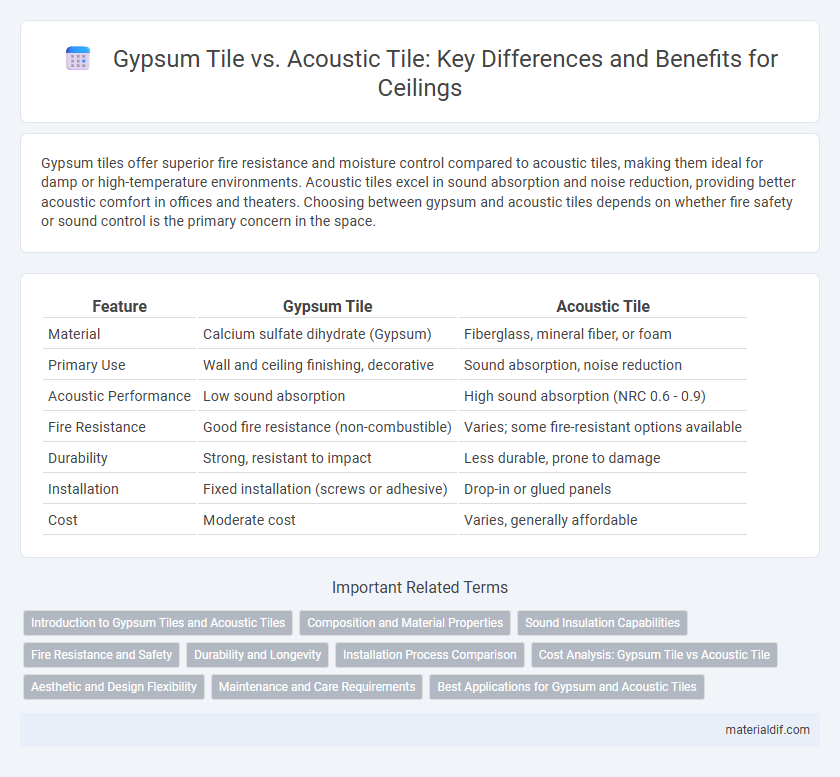Gypsum tiles offer superior fire resistance and moisture control compared to acoustic tiles, making them ideal for damp or high-temperature environments. Acoustic tiles excel in sound absorption and noise reduction, providing better acoustic comfort in offices and theaters. Choosing between gypsum and acoustic tiles depends on whether fire safety or sound control is the primary concern in the space.
Table of Comparison
| Feature | Gypsum Tile | Acoustic Tile |
|---|---|---|
| Material | Calcium sulfate dihydrate (Gypsum) | Fiberglass, mineral fiber, or foam |
| Primary Use | Wall and ceiling finishing, decorative | Sound absorption, noise reduction |
| Acoustic Performance | Low sound absorption | High sound absorption (NRC 0.6 - 0.9) |
| Fire Resistance | Good fire resistance (non-combustible) | Varies; some fire-resistant options available |
| Durability | Strong, resistant to impact | Less durable, prone to damage |
| Installation | Fixed installation (screws or adhesive) | Drop-in or glued panels |
| Cost | Moderate cost | Varies, generally affordable |
Introduction to Gypsum Tiles and Acoustic Tiles
Gypsum tiles are mineral-based panels primarily composed of calcium sulfate dihydrate, known for their fire resistance, moisture regulation, and smooth surface ideal for indoor wall and ceiling applications. Acoustic tiles, made from materials like fiberglass, mineral fiber, or foam, are specifically engineered to absorb sound, enhancing acoustic comfort in spaces such as offices, auditoriums, and studios. Both gypsum and acoustic tiles offer unique benefits, with gypsum focusing on structural and aesthetic properties while acoustic tiles prioritize sound insulation and noise reduction.
Composition and Material Properties
Gypsum tiles are primarily composed of calcium sulfate dihydrate, providing fire resistance and moisture regulation, while acoustic tiles are typically made from mineral fibers or fiberglass designed to absorb sound and reduce noise levels. Gypsum tiles offer a dense, rigid structure with moderate thermal insulation, whereas acoustic tiles feature a porous, lightweight composition enhancing sound absorption and minimizing echo. The inherent fire-retardant and mold-resistant properties of gypsum contrast with the superior acoustic performance and lighter weight of mineral-based acoustic tiles.
Sound Insulation Capabilities
Gypsum tiles provide moderate sound insulation by reducing echo and ambient noise, making them suitable for general indoor environments. Acoustic tiles are specifically engineered with porous materials and sound-absorbing cores to significantly enhance sound insulation, effectively minimizing noise transmission between rooms. For superior soundproofing in spaces requiring high acoustic performance, acoustic tiles outperform gypsum tiles due to their specialized design.
Fire Resistance and Safety
Gypsum tiles exhibit superior fire resistance due to their natural composition containing chemically combined water, which delays heat transfer and prevents flames from spreading rapidly. Acoustic tiles, often made from organic or mineral fibers, generally offer limited fire resistance and may emit toxic fumes when exposed to high temperatures. Choosing gypsum tiles enhances overall fire safety in building interiors by providing a durable, non-combustible barrier that complies with stringent fire protection standards.
Durability and Longevity
Gypsum tiles offer moderate durability with resistance to fire and moisture but can be prone to cracking under heavy impact, limiting their longevity in high-traffic areas. Acoustic tiles, often made from mineral fibers or fiberglass, provide enhanced sound absorption while maintaining durability, although they may degrade faster when exposed to moisture. For long-term performance, selecting gypsum tiles in controlled environments or acoustic tiles designed with moisture resistance ensures optimal durability and lifespan.
Installation Process Comparison
Gypsum tiles offer a straightforward installation process, typically involving direct fixing to drywall or ceiling grids using screws or adhesives, ensuring quick setup and minimal preparation. Acoustic tiles require additional steps such as specialized framing or suspended grid systems to enhance sound absorption, which can extend installation time and complexity. Both materials demand precise alignment, but gypsum tiles are generally favored for ease and speed in residential or commercial ceiling applications.
Cost Analysis: Gypsum Tile vs Acoustic Tile
Gypsum tiles generally offer a lower initial cost compared to acoustic tiles due to their simpler manufacturing process and availability of raw materials. Acoustic tiles, designed to enhance sound insulation and reduce noise, often incur higher expenses from specialized materials and production techniques. Long-term cost considerations include maintenance and replacement frequency, where gypsum tiles may require more frequent upkeep in high-moisture environments compared to the durable acoustic tiles.
Aesthetic and Design Flexibility
Gypsum tiles offer a smooth, clean finish with a variety of textures and patterns that enhance aesthetic appeal in both modern and traditional spaces. Acoustic tiles prioritize sound absorption but often feature limited design options, focusing more on functionality than visual versatility. The design flexibility of gypsum tiles allows for customizable shapes, sizes, and finishes that blend seamlessly into diverse interior styles.
Maintenance and Care Requirements
Gypsum tiles require minimal maintenance due to their moisture resistance and ease of cleaning with a damp cloth, making them ideal for environments prone to humidity. Acoustic tiles demand more careful upkeep, as they are sensitive to moisture and typically need regular dusting and occasional vacuuming to maintain their sound-absorbing properties. Proper maintenance of acoustic tiles also includes avoiding exposure to excessive humidity to prevent deterioration and loss of acoustic performance.
Best Applications for Gypsum and Acoustic Tiles
Gypsum tiles excel in interior wall coverings and ceiling applications where fire resistance, moisture control, and smooth finishes are essential, making them ideal for residential and commercial spaces requiring durability and aesthetics. Acoustic tiles are best suited for environments that demand sound absorption and noise reduction, such as theaters, recording studios, and open office spaces, where minimizing echo and improving sound quality is critical. Selecting gypsum tiles enhances structural integrity and visual appeal, whereas acoustic tiles optimize acoustic comfort and speech clarity.
Gypsum tile vs Acoustic tile Infographic

 materialdif.com
materialdif.com